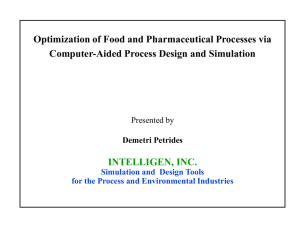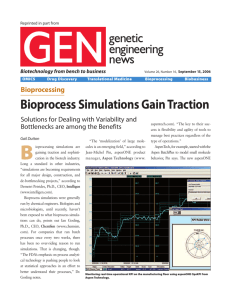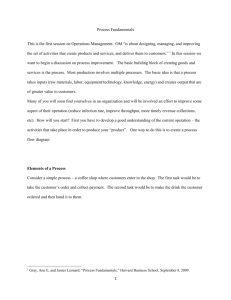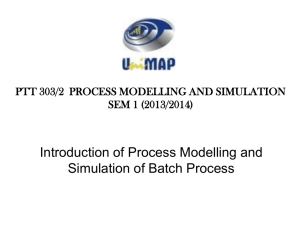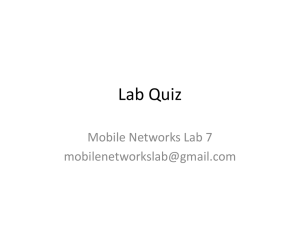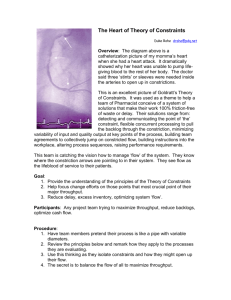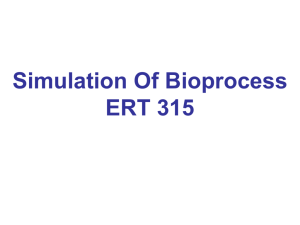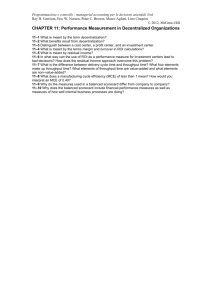INTELLIGEN, INC. Cost Analysis Results (Scenario 5)
advertisement
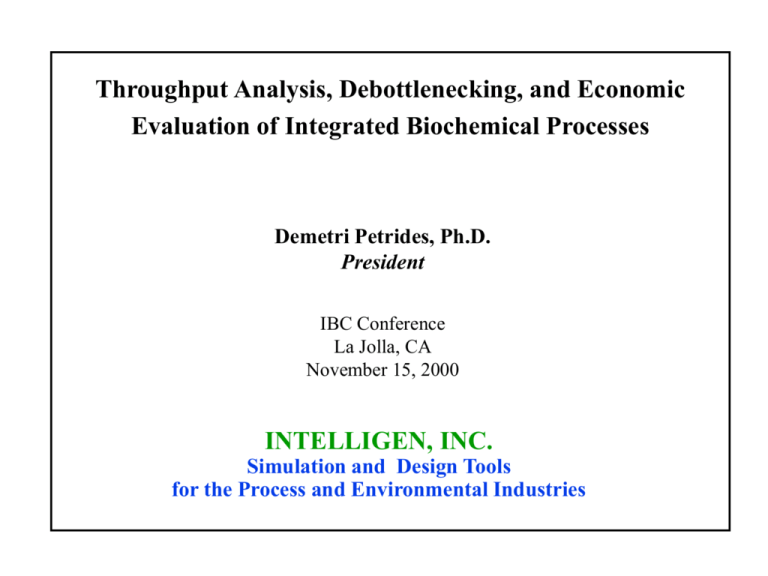
Throughput Analysis, Debottlenecking, and Economic Evaluation of Integrated Biochemical Processes Demetri Petrides, Ph.D. President IBC Conference La Jolla, CA November 15, 2000 INTELLIGEN, INC. Simulation and Design Tools for the Process and Environmental Industries Outline • Introduction • Motivation • Debottlenecking Theory • Debottlenecking Example • Cost Analysis • Conclusions INTELLIGEN, INC. Computer-Aided Process Design and Simulation INTELLIGEN, INC. Debottlenecking Questions • How much product can I make in this plant? • What limits the current production level? • What is the min capital investment for increasing production? INTELLIGEN, INC. Cost Analysis Questions • How much would it cost to make a kilo of product? • What is the required capital investment for a new plant? • Which process is better for making this product? A or B? • How can I reduce the operating cost of a process? INTELLIGEN, INC. The Role of CAPD and Simulation in Product Development and Commercialization IDEA GENERATION Project Screening, Strategic Planning Development Groups PROCESS DEVELOPMENT Evaluation of Alternatives Common Language of Communication FACILITY DESIGN Equipment & Utility Sizing and Design Development Groups Process Engineering Corporate Environmental Manufacturing MANUFACTURING On-Going Optimization, Debottlenecking Process Scheduling, Production Planning Manufacturing INTELLIGEN, INC. Who is Intelligen, Inc.? Established in the early 90’s - MIT spin off SuperPro Designer BioPro Designer BatchPro Designer EnviroPro Designer Biotechnology Food Processing Synthetic Pharmaceuticals Specialty Chemicals AgriChemicals Water Purification Wastewater Treatment Air Pollution Control INTELLIGEN, INC. Tool Description - Overview • Intuitive User Interface • Wide Variety of Unit Operation Models • Databases for Components and Mixtures • M&E Balances of Integrated Processes • Equipment Sizing and Costing • Project Economic Evaluation • Process Scheduling • Throughput Analysis & Debottlenecking • Waste Stream Characterization INTELLIGEN, INC. Intuitive User Interface Detailed Modeling using Unit Procedures and Operations Double-Click INTELLIGEN, INC. Flexible Operation Models (Column Elution) INTELLIGEN, INC. Operations Gantt Chart INTELLIGEN, INC. Throughput Analysis and Debottlenecking Theory INTELLIGEN, INC. Debottlenecking of Batch Operations Types of Bottlenecks Equipment Annual Throughput = Resources Batch Throughput x Number of Batches per Year INTELLIGEN, INC. Equipment Scheduling (Time) Bottlenecks Scheduling (Time) Bottleneck = Tank (V-101) Auxiliary Equipment (e.g., CIP and SIP skids) and resources also can become time bottlenecks. INTELLIGEN, INC. Equipment Capacity Utilization Equipment Capacity Utilization Equipment Capacity Utilization Liquid Volume = Max Liquid Volume Operating Throughput = Max Throughput INTELLIGEN, INC. Equipment Time Utilization EPBT Equipment Uptime Total Time Equipment is Utilized per Batch = Effective Plant Batch Time (EPBT) INTELLIGEN, INC. Equipment Throughput Bottlenecks Combined Utilization = Equipment Capacity Utilization x Equipment Uptime INTELLIGEN, INC. Potential for Throughput Increase Equipment Capacity Utilization EPBT Current Equipment Uptime Realistic Theoretical Current Batch Throughput Conservative Max Realistic Max Theoretical Max INTELLIGEN, INC. Equipment Throughput Bottlenecks INTELLIGEN, INC. Resource Bottlenecks INTELLIGEN, INC. Debottlenecking Strategy Annual Throughput Batch Throughput / Effective Batch Time Increase batch throughput until a size bottleneck is reached. Then, • Increase number of cycles of limiting procedure; • Rearrange equipment, or; • Use new equipment (stagger operation). INTELLIGEN, INC. Throughput Analysis Example Production of Therapeutic Monoclonal Antibodies INTELLIGEN, INC. INTELLIGEN, INC. Base Case Data Broth Volume = 4,000 L Bioreactor Volume = 6,500 L Max Working Volume = 6,175 L Product Titer = 1 g/L Recovery Yield = 56% Fermentation Time = 10 days INTELLIGEN, INC. Equipment Utilization Chart (Base Case) Scheduling (Time) Bottleneck = V-101 EPBT = 11 days Batch Throughput = 2.3 kg Batches per Year = 29 Annual Throughput = 67 kg INTELLIGEN, INC. Capacity, Time, and Combined Utilization Chart (Base Case) Capacity Utilization of Bottleneck Equipment = 65% INTELLIGEN, INC. Scenario 1 Action Increase batch size by 54% (broth volume 4,000 L 6,175 L) Warnings Chromatography columns cannot handle new batch in 2 cycles. Action Increase # of cycles per batch from 2 to 3. New Results Batch throughput Number of Batches per Year Annual Throughput 3.55 kg 29 103 kg INTELLIGEN, INC. Capacity, Time, and Combined Utilization Chart (Scenario 1) Capacity Utilization of Bottleneck Equipment EPBT = 11 days Batch Throughput = 3.55 kg Batches per Year = 29 Annual Throughput = 103 kg = 100% INTELLIGEN, INC. Scenario 2 Observation Downstream section is underutilized in time. Action Introduce new bioreactor and stagger its operation based on the new time bottleneck equipment. INTELLIGEN, INC. Capacity, Time, and Combined Utilization Chart (Scenario 2) Scheduling (Time) Bottleneck = DF-102 EPBT = 196 h (initial 264 h) Batches per Year = 39 (initial 29) Annual Throughput = 138 kg Number of Bioreactors = 2 INTELLIGEN, INC. Scenario 3 Action Add extra diafilter to eliminate current time bottleneck. New Results Batch throughput Number of Batches per Year Annual Throughput 3.55 kg 44 (29 39 44) 156 kg INTELLIGEN, INC. Capacity, Time, and Combined Utilization Chart (Scenario 3) Scheduling (Time) Bottleneck = V-103 EPBT = 171.5 h (264 h 196 h 171.5) Batches per Year = 44 (29 39 44) Annual Throughput = 156 kg Number of Bioreactors = 2 INTELLIGEN, INC. Scenario 4 Action Add extra storage tank to eliminate current time bottleneck. New Results Batch throughput Number of Batches per Year Annual Throughput 3.55 kg 58 (29 39 44 58) 206 kg INTELLIGEN, INC. Capacity, Time, and Combined Utilization Chart (Scenario 4) Scheduling (Time) Bottleneck = V-101 EPBT = 130.3 h (264 h 196 h 171.5 130.3) Batches per Year = 58 (29 39 44 58) Annual Throughput = 206 kg Number of Bioreactors = 2 INTELLIGEN, INC. Scenario 5 Action Add extra bioreactor and diafilter. New Results Batch throughput Number of Batches per Year Annual Throughput 3.55 kg 84 (29 39 44 58 84) 298 kg INTELLIGEN, INC. Capacity, Time, and Combined Utilization Chart (Scenario 5) Scheduling (Time) Bottleneck = V-105 EPBT = 89.7 h (264 h 196 h 171.5 130.3 89.7) Batches per Year = 84 (29 39 44 58 84) Annual Throughput = 298 kg Number of Bioreactors = 3 INTELLIGEN, INC. Comparison Scenario Bioreactor Membrane Number Vessels Diafilters Storage Tanks Batches per Year Batch Throughput Annual Throughput 0 1 3 3 29 2.3 kg 67 kg 1 1 3 3 29 3.5 kg 103 kg 2 2 3 3 39 3.5 kg 138 kg 3 2 4 3 44 3.5 kg 156 kg 4 2 4 4 58 3.5 kg 206 kg 5 3 5 4 84 3.5 kg 298 kg INTELLIGEN, INC. Labor Demand as a Function of Time INTELLIGEN, INC. WFI Demand as a Function of Time INTELLIGEN, INC. Cost Analysis INTELLIGEN, INC. Cost Analysis Results (Base Case) Production Rate 67 kg/yr Equipment Cost $2.3 M Total Investment $25.4 M Operating Cost $12.9 M/yr Lab/QC/QA 1% Consumables 29% Labor-Depended 5% Unit Cost $193/g Waste Disposal 4% Raw Materials 27% DFC-Dependent 34% Distribution per Section Upstream 43 % Downstream 57 % INTELLIGEN, INC. Comparison of Various Options 300 250 200 150 Unit Cost ($/g) Annual Throughput (kg) 100 50 Scenario 5 Scenario 4 Scenario 3 Scenario 2 Scenario 1 Base Case 0 INTELLIGEN, INC. Cost Analysis Results (Scenario 5) Lab/QC/QA 1% Production Rate 298 kg/yr Operating Cost $41.1 M/yr Unit Cost $138/g Consumables 39% Labor-Depended 6% Key Assumption Unit cost of raw materials and consumables remained unchanged Waste Disposal 5% Raw Materials 36% DFC-Dependent 13% Distribution per Section Upstream 38 % Downstream 62 % INTELLIGEN, INC. SuperPro Designer v5.0 Spring 2001 INTELLIGEN, INC. From Single to Multiple-Recipe Projects SuperPro v4.5 (current) SuperPro v5.0 Single-Recipe Project Multi-Recipe Project Perform at the Facility Level • • • • Scheduling and Planning Resource Tracking Equipment Utilization Debottlenecking INTELLIGEN, INC. Project Architecture SuperPro Project Databases Recipe 1 Sites Recipe 2 Recipe 3 Facilities Utilities Multi-Product Manufacturing Facility Labor Equipment Construction Materials Raw Materials INTELLIGEN, INC. Display of Multi-Recipe Projects Worksheets (recipes) INTELLIGEN, INC. Summary Process Simulation can play a role in: • Facilitating Process Development • Improving Team Communication • Increasing Plant Throughput • Reducing Capital and Operating Cost INTELLIGEN, INC. For a fully functional demo of SuperPro Designer & A book chapter on Bioprocess Design & Economics Go to www.intelligen.com
